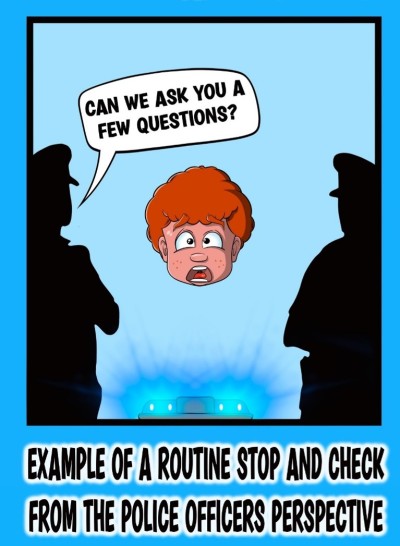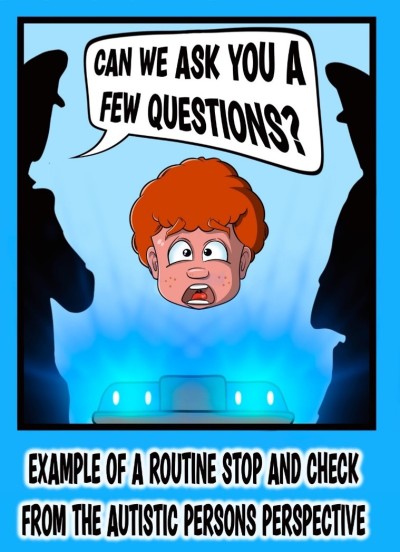Use the 'next' button to view the Autism Strategy page by page.
Improving support within the criminal and youth justice systems

In this section we have included examples by Autistic Minds to help illustrate the perspective of an autistic person's interaction with the police.
Later in this section we discuss:
- Themes, feedback and suggestions raised by people during our review
- Our commitments to deliver this aim
- How we will work towards our aim within CWP between 2022-2027
- How we will work towards our aim with partners between 2022-2027
Artwork by Helen Boyle ‘Emotional churn just before meltdown or shutdown’
| Improving support within the criminal and youth justice systems | |
|
Example of a routine stop and check from the police officers perspective:  "Can we ask you a few questions?" |
Example of a routine stop and check from the autistic persons perspective:  "CAN WE ASK YOU A FEW QUESTIONS?" |
|
Chris has been stopped by the police. This unexpected change is very distressing and their senses are overwhelmed. They are hypersensitive to stimuli and perceive things larger, louder, brighter than they are. Physical contact is unbearable. Chris needs extra time to take on information and answer questions. They need as much personal space as possible.
CWP work with the criminal justice system to ensure Chris's needs are understood and supported with reasonable adjustments. They are able to understand and participate fully throughout the process. |
|
|
We did not receive any direct comments about criminal and youth justice systems, so draw the following from the Beyond the High Fence report produced by Pathways Associates and NHS England in 2019. Workforce development Aim 1 issues raised were like those raised and discussed in our review around:
Quality of service provision and delivery
Support in hospital:
Forensic Support in the Community
Working with partners and stakeholders
|
|
Workforce development Please refer to our commitments under Aim 1: improving understanding and acceptance of autism within society. Quality of Service Provision and Delivery We will continue our work to support autistic people in low secure mental health inpatient settings to have a safe, effective and timely transition back into the community. Working with partners and stakeholders We will improve the understanding of autism across the local criminal and youth justice system including prison in-reach, probation and local police force. This will include advice and guidance around common offence areas such as radicalisation, stalking, arson, on-line activity and sexual offending. We will work with justice partners to improve access to assessment and referrals for support for autistic people in contact with the criminal and youth justice systems.
|
How we will work towards our aim within CWP between 2022-2027:
Workforce development
As a partner in the Prospect Partnership for secure services in Cheshire and Merseyside, we will lead co-produced development and delivery of autism training for Community Forensic Services across Cheshire and Merseyside. Levels 2 - 4 will be to improve the skills of people working in Community Forensic Teams.
Quality of Service Provision and Delivery
Please refer to our Aim 4 and Aim 5 commitments to improve service provision and delivery.
For CWP clinicians in youth justice services we will work on supporting interfaces with other CAMHS pathways, and support with early recognition of neurodevelopmental conditions.
How we will work towards our aim with partners between 2022-2027:
Working with partners and stakeholders
As a partner in the Prospect Lead Provider Collaborative, we will lead co-produced development and delivery of autism training for Community Forensic Services across Cheshire and Merseyside. Level 1 of this training will be outreach training to partner organisations (social care, criminal justice and health).
Working with commissioners, we will increase the capacity within our community forensic team which will improve access to assessment and referrals.
Working with social care and criminal justice partners, our Community Forensic Team will continue to support individuals coming through the secure inpatient pathway to safely live in the community.